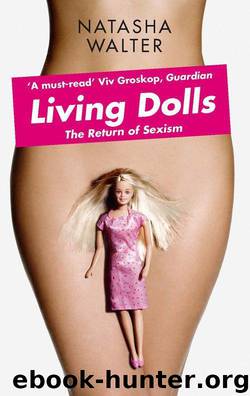Living Dolls: The Return of Sexism by Natasha Walter

Author:Natasha Walter
Language: eng
Format: mobi, epub
ISBN: 9780748132065
Publisher: Little, Brown Book Group
Published: 2011-05-25T14:00:00+00:00
8: Myths
In order to see more clearly how we are often presented with a skewed picture of the real state of debate about sex differences, we can look at a controversy that erupted a few years ago. In 2005 Lawrence Summers, then president of Harvard University, got into a much publicised spat about the innate differences between men and women. He had been asked to speak about the under-representation of women on the science and engineering faculty at Harvard. When he came to give his talk at the National Bureau of Economic Research to a group of about fifty academics, he argued that because women naturally see the world in terms of family and human relationships, they will not be as happy as men in high-intensity careers.1 He also argued that women do not have the same propensity as men to excel in scientific thought, which he called ‘different availability of aptitude at the high end’. He said that such innate differences between men and women were more important than any social factors in creating inequality in certain occupations. ‘So my best guess,’ he said, ‘… of what’s behind this is that the largest phenomenon, by far, is the general clash between people’s legitimate family desires and employers’ current desire for high power and high intensity, that in the special case of science and engineering, there are issues of intrinsic aptitude, and particularly of the variability of aptitude, and that those considerations are reinforced by what are in fact lesser factors involving socialization and continuing discrimination.’
As we have seen, these views have become pretty commonplace today. Many writers, teachers and parents now downgrade the influence of socialisation in favour of biological differences, and assume that women will naturally be more focused on relationships than working life, and less suited to logical and scientific thought. Although this view has now moved into the mainstream, it was very telling that if you look at the way the debate was covered in the British media, it was constantly suggested that Summers was actually breaking down some kind of taboo.
For instance, alongside its news reports the Financial Times ran two feature articles about the Summers dispute. In the first article the writer, Christopher Caldwell, stated that ‘there is no clear evidence contradicting what Summers said. What there is, instead, is a taboo.’ He went on to refer to Summers’s ‘easy erudition’ and the fact that he was a ‘first-rate scholar’; his critics, on the other hand, were characterised as ‘resolutely obscurantist’ and ‘anti-intellectual’.2 In a second article the same writer argued that there were no good arguments against what Summers said, but only the ‘taboos that protect professorial privilege and self-regard’, and damned the ‘political correctness’ of Harvard’s faculty for arguing with him.3
Other newspapers also considered the debate in the same light. The Sunday Times covered the debate three times. Once, the conservative commentator Andrew Sullivan wrote, ‘Summers is the best thing to happen to American higher education in a very long time…. For
Download
Living Dolls: The Return of Sexism by Natasha Walter.epub
This site does not store any files on its server. We only index and link to content provided by other sites. Please contact the content providers to delete copyright contents if any and email us, we'll remove relevant links or contents immediately.
| African-American Studies | Asian American Studies |
| Disabled | Ethnic Studies |
| Hispanic American Studies | LGBT |
| Minority Studies | Native American Studies |
Cecilia; Or, Memoirs of an Heiress — Volume 1 by Fanny Burney(32559)
The Great Music City by Andrea Baker(32020)
Cecilia; Or, Memoirs of an Heiress — Volume 2 by Fanny Burney(31957)
Cecilia; Or, Memoirs of an Heiress — Volume 3 by Fanny Burney(31943)
We're Going to Need More Wine by Gabrielle Union(19049)
All the Missing Girls by Megan Miranda(16034)
Pimp by Iceberg Slim(14513)
For the Love of Europe by Rick Steves(14144)
Bombshells: Glamour Girls of a Lifetime by Sullivan Steve(14077)
Talking to Strangers by Malcolm Gladwell(13374)
Norse Mythology by Gaiman Neil(13371)
Fifty Shades Freed by E L James(13244)
Mindhunter: Inside the FBI's Elite Serial Crime Unit by John E. Douglas & Mark Olshaker(9345)
Crazy Rich Asians by Kevin Kwan(9294)
The Lost Art of Listening by Michael P. Nichols(7507)
Enlightenment Now: The Case for Reason, Science, Humanism, and Progress by Steven Pinker(7315)
The Four Agreements by Don Miguel Ruiz(6766)
Bad Blood by John Carreyrou(6623)
Weapons of Math Destruction by Cathy O'Neil(6282)
